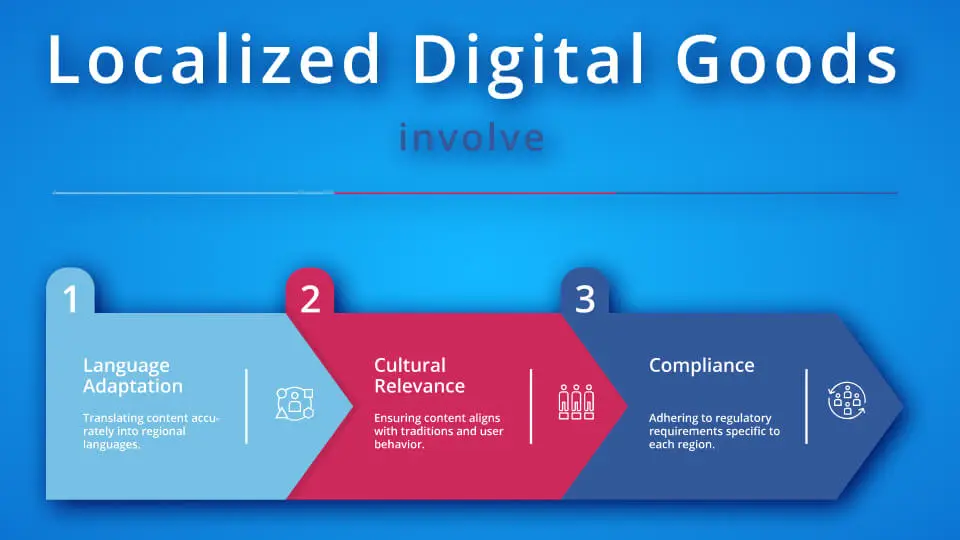Internet penetration is reshaping global markets, making digital adaptation essential for businesses targeting emerging regions.
Localized digital goods products are not just about translation; they are tailored solutions to cater to specific cultural and market demands. It helps B2B companies inspire trust, ensures engagement, and fosters long-term customer loyalty.
We at HKS Global Group specialize in the development of region-specific digital solutions that drive business growth and closer engagement with target audiences.
The following article focuses on the importance of localized digital goods, their benefits, practical strategies, and future trends that help your business remain competitive and relevant.
What is the localization of digital products?
Localization of digital products refers to a process in which products and services are adapted to suit the culture and preferences of the local market.
Localization of digital products means making adaptations to the product and services to fit the culture and preferences of the local market.
Localized Digital Goods involve:
- Language Adaptation: Translating content accurately into regional languages.
- Cultural Relevance: Ensuring content aligns with traditions and user behavior.
- Compliance: Adhering to regulatory requirements specific to each region.
Why Localization Matters for B2B Companies
Traditionally, global companies viewed digital products as a one-size-fits-all opportunity. This approach no longer suffices. In particular, emerging markets need bespoke solutions to tackle local problems and grasp local opportunities.
Localized digital goods allow businesses to:
- Establish trust
- Demonstrate respect for cultural identities
- Create a stronger emotional connection with users.
Understanding the Demand for Localized Digital Goods
Emerging markets in the MENA region are characterized by diversity in language, culture, and consumer preferences.
For B2B businesses, providing localized digital goods solutions is no longer a choice but a necessity.
Key Factors Driving Localization:
- Cultural Relevance: Digital goods tailored to local languages, traditions, and user behavior are more likely to succeed.
- Regulatory Compliance: Many MENA countries have unique data protection laws and licensing requirements for digital goods.
- User Trust: Businesses prefer partners who understand their market’s nuances.
Example: A digital voucher system integrated with local payment gateways such as Mada in Saudi Arabia or Fawry in Egypt can significantly enhance usability.
The scope of localization reaches across industries, including software, e-commerce platforms, digital media, education tools, and entertainment services. Businesses that leverage localized digital goods gain an edge by delivering seamless, relevant experiences for their customers.
Emerging Market Challenges and Opportunities
While there are great growth prospects, emerging markets bring with them their own special set of challenges. From diverse customer needs to regulatory and market dynamics, a successful business has to make its way through it. Herein, we explore key challenges and opportunities in the regions.
Challenges:
- Diverse Market Needs: Serving countries with varying levels of technological adoption.
- Regulatory Barriers: Navigating different laws and certifications.
- Pricing Sensitivity: Offering competitive pricing without compromising margins.
- Localized Digital Goods: Adapting products for local preferences and overcoming infrastructure challenges.
Opportunities:
- Untapped Customer Base: Millions of businesses are transitioning to digital solutions.
- High Growth Potential: The digital economy in MENA is expected to grow by 20-30% annually.
- Early Entrant Advantage: Establishing a localized digital goods presence now can solidify market dominance.
3 Key Benefits of Localised Digital Goods for Businesses
Localization of digital products helps companies to better connect with customers, increasing engagement, sales, and loyalty by appealing to regional needs and preferences. Following are three key benefits of localization.
Enhancing Customer Engagement and Trust
Localized digital goods products resonate better with audiences because they feel personal and authentic. Customers are more likely to engage with brands that speak their language, both literally and figuratively.
Boosting Sales through Tailored Offerings
Businesses can improve conversion rates by offering solutions that align with regional preferences, pricing sensitivities, and user needs. For example, adapting pricing to match local purchasing power can attract more buyers.
Improving Brand Loyalty and Retention Rates
By prioritizing localization, businesses show a commitment to meeting customer needs. This builds trust and long-term loyalty, encouraging repeat business and referrals.
Effective Approaches for Mastering Localized Digital Goods in MENA
To thrive in the MENA region, businesses must adapt their digital goods to local needs. This section highlights key strategies for ensuring your products resonate, including cultural adaptation, local payment systems, and scalable solutions.
Focus on Language and Cultural Adaptation
- Translate your product interfaces, websites, and customer support channels into Arabic and other regional languages.
- Use culturally relevant visuals and examples in marketing campaigns.
Integrate Local Payment Systems
Offering payment options familiar to your audience can significantly boost adoption. Integration with platforms like Payfort, Fawry, and STC Pay simplifies transactions.
Offer Scalable Solutions
Emerging businesses in the MENA region require flexible solutions. Providing customizable and scalable digital goods ensures long-term partnerships.
Case Study: An e-gift card provider partnered with retailers in the UAE to deliver localizing digital goods campaigns, leading to a 40% increase in adoption rates.
Overcoming Challenges in Localised Digital Goods
Localized digital goods offer significant benefits, but it is not without challenges. Addressing these issues is important to achieve success for your business:
Balancing Cost Efficiency with Quality Localisation
Localized digital goods can be resource-intensive, especially for businesses with limited budgets. However, sacrificing quality for cost savings can backfire. Partnering with reliable localization services ensures accuracy and cultural relevance.
Navigating Regulatory and Compliance Issues
Different regions have varying laws regarding data privacy, content standards, and digital transactions. Businesses must ensure compliance to avoid legal pitfalls and maintain customer trust.
Addressing Cultural Sensitivity in Marketing
Cultural missteps can lead to reputational damage. Collaborating with local experts or native speakers can help businesses avoid unintentional offenses in marketing and messaging.
Conclusion
For emerging markets in the MENA region, localized digital goods are not just a strategy but a competitive advantage. This, of course, is where a business should focus on cultural relevance, integrate local payment systems, and provide scalable solutions for growth.
Your business can unlock the potential of these thriving markets by learning from industry leaders and focusing on customer-centric approaches.
Enhance your digital goods strategy with HKS Global Group! With our proven expertise in market research, localization, and tailored solutions, we ensure your business succeeds in emerging markets.
Partner with us today! And know more about how can we help your business.
FAQs
What are digital goods, and why is localization essential?
Digital goods include non-physical items like e-gift cards, software, and digital vouchers. Localization ensures these products align with local cultural and language preferences, enhancing user adoption.
How can my business start Localizing its digital goods for MENA?
Begin by understanding the cultural and legal requirements of your target market. Partner with local experts and integrate regional payment systems to enhance usability.
What are the benefits of integrating local payment methods?
It simplifies transactions for users, builds trust, and boosts conversion rates in markets where international payment options may not be widely used.
Maria
I'm a Fintech & Digital Distribution Writer. I do create engaging content on B2B solutions, gift cards, eSIMs, and prepaid services and more. I provide tailor-made solutions that empower businesses and consumers.





